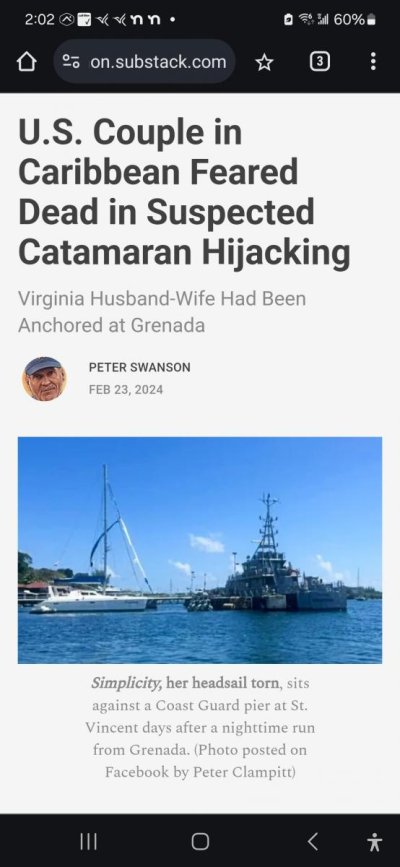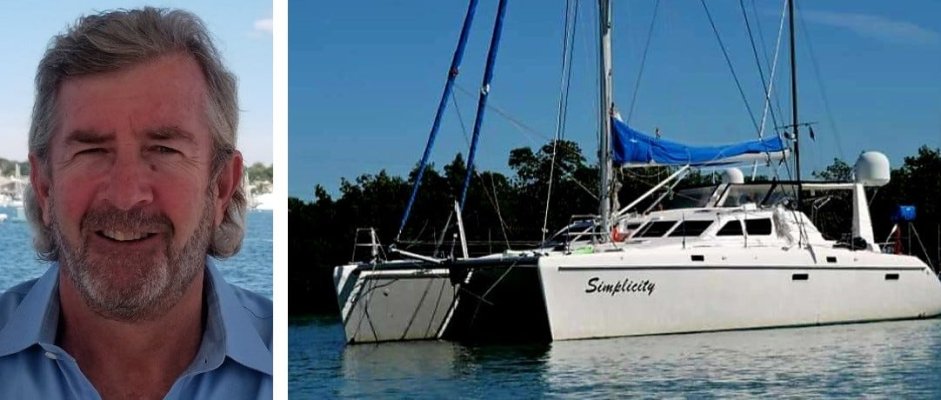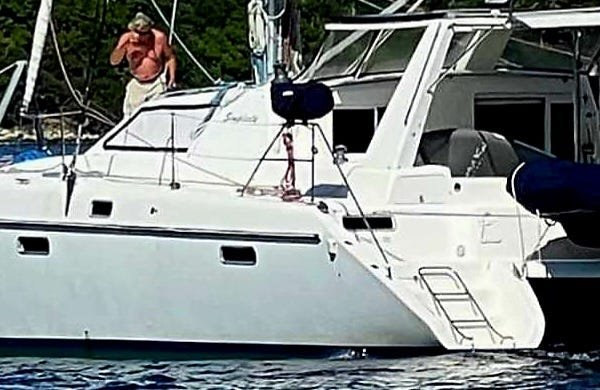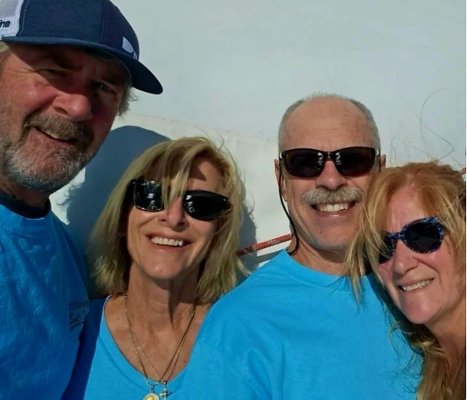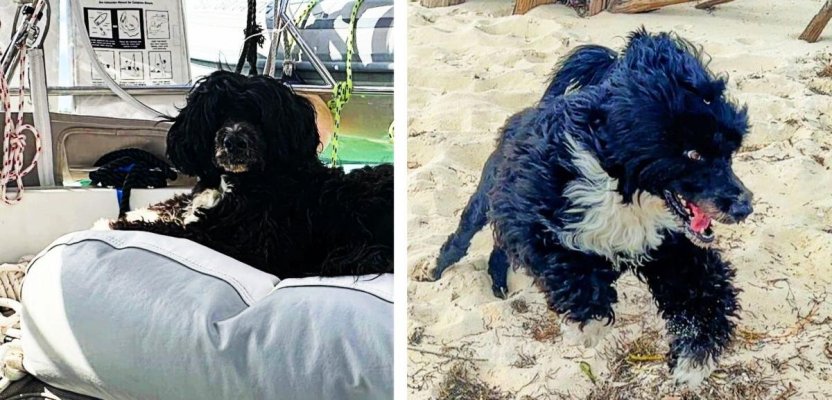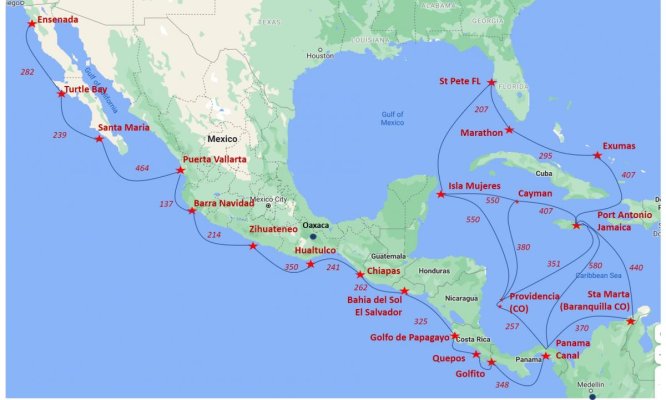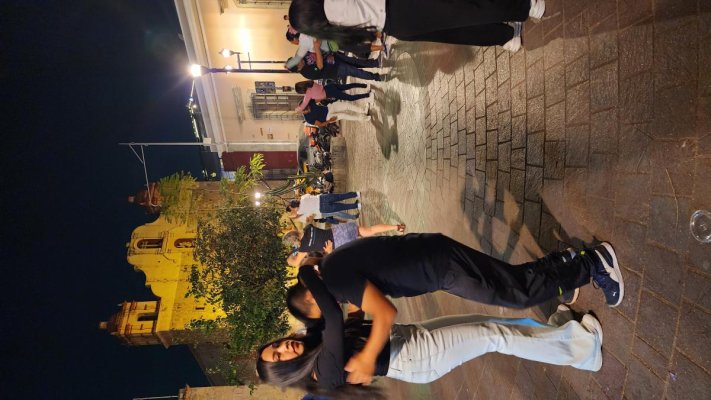Updated article...
https://loosecannon.substack.com/p/...r=2sl664&utm_source=substack&utm_medium=email
Random Thoughts on the Horrific Events at Grenada
Regarding Cat Security: That Sugar Scoop Is Like an Open Gate
PETER SWANSON
2/29/2024
A fellow cruiser snapped this shot of Ralph Hendry aboard Simplicity. Note the ease of access to the deck of the boat via her port sugar scoop.
Objectively, Grenada is a safe island despite the recent hijacking of a U.S.-flagged catamaran and the likely murder of her owners. Cruisers like the place, and nothing in the overall crime data suggests they shouldn’t. There’s more to it, however.
This story is a random collection of observations in the wake of the almost-certain deaths of Ralph Hendry and Kathy Brandel, whose first Caribbean cruise ended horribly at Grenada. But first a message for the couple hundred new Loose Cannon subscribers who signed up after reading the story about their ordeal and, to a lesser extent, that of a Swedish sailor who wrecked on a Colombian beach:
Lurid crime is not the only topic reported by Loose Cannon. Please visit the website to get a sense of the full mix of coverage. You will find stories about vessel design, interesting characters, important court cases, nautical history and oddball occurrences.
A few days before the events in Grenada there was a story about a New York State gun law that was frustrating guns-on-boats people wanting to cruise the American Great Loop. The story included an estimate of how many U.S. cruisers down-island carried firearms—about a third.
Predictably, after Loose Cannon broke the Grenada story internationally (followed later in the day by CNN, NBC, CBS et al.), some commenters were posting that this was a case for guns on boats.
Not exactly. Grenada requires that guns be checked with island authorities during a stay in local waters. If there’s one thing that subsequent news coverage strongly suggested, it was that Hendry and Brandel were not rule-breakers, so it is difficult to see how having guns locked up far away in a customs office or police station would have changed anything.
The fact is we don’t know the sequence of events to the hijacking of their St. Francis 48 cat, named Simplicity, but there are three plausible scenarios.
One fellow cruiser—a neighbor in the anchorage—suggested that the trio of jail escapees linked to the crime may have taken the couple while they were ashore, and they all went together to the couple’s boat.
A second scenario—oft repeated by criminals on other Eastern Caribbean islands—is that the escapees came in a small boat, boarded Simplicity and took her owners by surprise. Nothing in local news reports suggests that, however.
And the third is that the escapees swam out. These guys were desperate and swam to the nearest boat that looked like it could be boarded easily. That’s normally a selling point for cats—their sugar scoops make it easier for swimmers to board. Even if the swim ladder is stowed in the up position, it provides a place for someone to grip and hoist himself up.
A catamaran or any contemporary monohull with a platform notched into the transom is like having an open gate on a fenced yard. It’s not that a determined thief cannot climb over the slab side of, say, a 40- to 50-foot monohull, it’s just that it requires quite a bit more athleticism. Try it sometime.
Also, the sudden addition of weight outboard will induce movement that might actually wake a sleeping owner atuned to the abnormal motion of his or her boat in calm water.
Troubled Region
This story began by noting that Grenada is popular among cruisers because it is perceived to be a welcoming and safe place. The problem is that it is smack in the middle of islands where drug trafficking has led to the rise of gang violence.
InsightCrime is a think tank and media outlet that studies organized crime. Here’s how it describes the region: “The Caribbean’s geographic location and countless islands make it a huge transshipment route for drugs heading to the United States, a dynamic that has fostered high rates of violence and gang-related crime.”
The prime minister of Grenada made the same point in January 2023. “Our island(s) are under constant threat from the importation of small firearms in particular. They are coming in barrels, they are coming in containers…We are probably the last bastion of little or no gun violence in the region,” Prime Minister Dickon Mitchell said, adding that St. Lucia, Jamaica and Trinidad and Tobago all faced the same problem.
For sure, reaction to this story will include all manner of anecdotal defense of Eastern Caribbean cruising and comparisons to crime rates in places bereft of palm trees. The drumbeat of incidents reported by the Caribbean Safety and Security Network, however, suggests that would be delusional to think that some invisible force prevents criminals in island settlements from making mischief in the anchorages.
Here at home, no one is too surprised when a suburban home near an inner city is subjected to a home invasion.
Loose Cannon tipped off the Washington Post to the events in Grenada, hoping that since the victims had resided in Fairfax, Virginia, Post reporters would deliver some unique insights into the lives of Hendry and Brandel. The coverage wasn’t bad but unearthed nothing new.
That other Post, however, did give us something to think about. The New York Post story was headlined, “Pals sailing with Virginia couple before yacht hijacked say they felt safer in Caribbean than U.S.: ‘We’d leave the door unlocked’.”
Pete and Tammy Sisson of Rhode Island were quoted about how they rode down to the islands with Hendry and Brandel and a third guest as part of the Salty Dawg Rally from the U.S. East Coast to Antigua. They flew home before the hijacking. Sisson’s full quote actually specified that the cat’s door was left opened during the day.
The couple at right, Pete and Tammy Sisson, said they felt very safe after arriving in the Caribbean with Ralph Hendry and Kathy Brandel.
We all have nearby places in the U.S. that we might avoid. The boat where this is is being typed is serenely equidistant between two such places—the drive-by shooting neighborhoods of Jacksonville and the meth-lab and rattlesnake forests of interior Florida. Plus, I would assume most of us keep our boats open during the day at populated anchorages.
Hatches Closed?
The question for Sisson is: Did they lock the doors and close hatches at night?
For sure, that big St. Francis would have a genset and air-conditioning system capable of cooling her down for the night, but what does the fact that doors need to be locked say? If this were standard procedure aboard Simplicity, it would lend credence to that neighbor’s theory that Hendry and Brandel were taken while still ashore.
However, many cruising boats still don’t have a generator sufficient in wattage to power AC. Some don’t have a generator at all. Those folks used to enjoy sleeping with all hatches open, as airscoops funneled a cooling katabatic breeze aftward through the vessel.
Now, the only way for the situationally aware in the Caribbean to sleep soundly—without a humming compressor—might be the addition of “burglar bars” on all the hatches. What’s the alternative?
Oddly, in all the discussion, no one has sung the praises of history’s most tested combination of danger alerting, intruder deterrence and personal protection—a family dog.
Nuri the Portuguese water dog is protector of the Valiant 42 Little Wing. Ted Arisaka says that even though she looks fierce, Nuri’s bark is probably worse than her bite, but sometimes barking is enough.
More interesting than the Washington Post story was the comment section at the bottom. A lot of readers were skeptical of a GoFundMe campaign to benefit the adult sons of the victims. What these readers needed to understand was that even though these parents were well off financially, that doesn’t mean their heirs would have access to inheritance money to deal with immediate expenses regarding the boat and probably some other stuff. It could take more than a year, especially if the bodies are not recovered.

